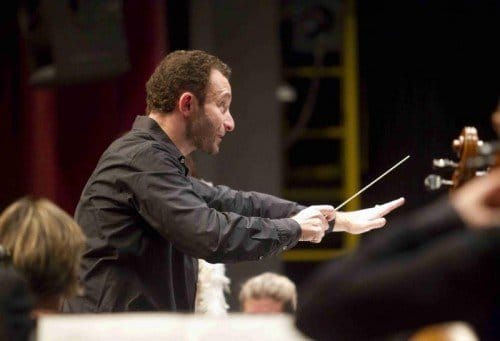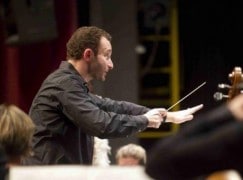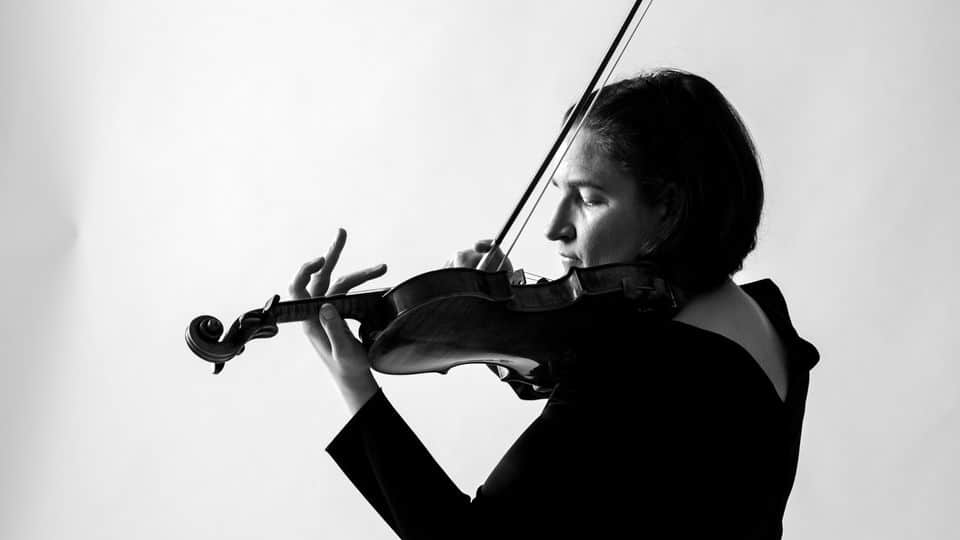Berlin Phil rolls out its first Kirill Petrenko season
mainSo what will the new chief bring? All has just been revealed in Berlin.
There’s a lot of Beethoven, including a prison spell.
Focus on Josef Suk and Edgar Varèse. Now that’s unexpected.
Puccini’s Suor Angelica.
And a boutique mini-season for Emmanuelle Haim.
Interesting, though far from revolutionary.
Read press release below.

The 2019/2020 Season of the Berliner Philharmoniker Foundation with the New Chief Conductor Kirill Petrenko
The opening of the 2019/2020 season marks the beginning of a new chapter in the history of the Berliner Philharmoniker: Kirill Petrenko begins his tenure as the orchestra’s seventh chief conductor. The traditional opening concert of the season at the Philharmonie on 23 August and the open-air concert at the Brandenburg Gate the following evening, part of the celebration of the 30th anniversary of the fall of the Berlin Wall, are the starting point for many collaborative projects whose energy will spread far beyond the city. The focus will be the concerts in Berlin, which will be supplemented by three tours with Kirill Petrenko: the festival tour at the beginning of the season, a German tour in February and, to commemorate the 75th anniversary of the end of the Second World War, the European Concert in Tel Aviv, followed by a European tour.
“Seid umschlungen” – Ludwig van Beethoven’s 250th Birthday
Naturally, the Berliner Philharmoniker will also congratulate Ludwig van Beethoven on the 250th anniversary of his birth. Three of his major works – the Missa solemnis, the Ninth Symphony and his only opera, Fidelio – are reserved for the chief conductor. Kirill Petrenko will conduct these works, which are so typical of Beethoven, both in Berlin and on tour. Sir Simon Rattle returns to the Philharmonie for the rarely performed oratorio Christ on the Mount of Olives. This programmatic focus will culminate with a Beethoven marathon on 25/26 April, during which all the composer’s string quartets and other chamber music works will be presented by musicians from the Berliner Philharmoniker over a two-day period. The quartets can also be heard beforehand during the Easter Festival in Baden-Baden, spread over ten days in the chamber music series, Master Concerts. In addition, Ludwig van Beethoven’s birthday will also be celebrated in the jazz series and the Philharmonic discussion series Discourse. The Education Programme will devote itself to Beethoven with a Fidelio project at Tegel Prison.
Featured Composers
“His music was one of the greatest discoveries of the past few years for me,” says Kirill Petrenko about Josef Suk in his preface to the season preview. The Berliner Philharmoniker will focus on the composer both in symphonic repertoire – conducted by their chief conductor – and chamber music. Continuing the orchestra’s long Mahler tradition, Kirill Petrenko will interpret the composer’s Fourth and Sixth Symphonies. Another emphasis will be Edgard Varèse – a sound experimenter who defies categorization. The majority of his works for orchestra will be heard during the coming season.
Marlis Petersen as Artist in Residence
Soprano Marlis Petersen will serve as Artist in Residence this season – an exceptional singer who has cultivated a close musical friendship with Kirill Petrenko for many years. During this season concertgoers will have the opportunity to experience her from very different artistic perspectives. Marlis Petersen will appear as the soloist in Alban Berg’s Lulu Suite at the opening concert of the season, make her debut in the role of Leonore in Fidelio at the Easter Festival in Baden-Baden and give a song recital entitled “Anderswelt” (Otherworld). “The residency with the Berliner Philharmoniker is a great honour for me,” says Marlis Petersen. “At the same time it is a musical thank you from Kirill Petrenko for our previous work together. I’m very touched by that.”
Education Project with Kirill Petrenko
The Education Programme of the Berliner Philharmoniker will continue to be an important part of the orchestra’s concert calendar. This work also means a great deal to Kirill Petrenko. For his first Education project he has chosen the opera Suor Angelica by Giacomo Puccini, which he will present together with the scholars of the Karajan Academy, vocal soloists and students from Berlin’s music academies and members of our children’s choral project “Vocal Heroes” at the beginning of February.
Orchestra Members as Soloists
In addition to chamber music, another component is part of the DNA of the Berliner Philharmoniker. During the coming season, members of the orchestra will appear as soloists on seven concert programmes, for example, first principal violist Amihai Grosz and first principal cellist Ludwig Quandt, who will be heard as soloists in Richard Strauss’s Don Quixote during the two-week Japanese tour in November conducted by Zubin Mehta, who is an honorary member of the Berliner Philharmoniker.
Short Festivals
Listeners can enjoy unusual programming next season in the form of short festivals. For example, the cultural bond with Israel will be highlighted: in addition to a guest appearance by the Israel Philharmonic Orchestra under Zubin Mehta during the Musikfest Berlin in September, the short festival “Tel Aviv– Berlin” will take place on 14/15 March. The Philharmonie will be energized for a weekend on 7/8 February with an electronic music festival entitled “Strom” (Electricity). The project will be organized by Stefan Goldmann.
World and German Premieres
Five world premieres, with compositions by Hans Abrahamsen, Peter Eötvös, Donghoon Shin, Toshio Hosokawa and Rachel Laurin, as well as two German premieres – Danny Elfman’s Piano Quartet and Peter Eötvös’s Alhambra – are on the programme for the coming season. Details on dates and performers can be found in the attachment “Information on the 2019/2020 Season”, in our season preview and on our website.
New and Familiar Guests
Santtu-Matias Rouvali (20/21/22 September) and Teodor Currentzis (29/30 November) will make their debuts conducting the Berliner Philharmoniker. In addition to the long-time partners mentioned above, former chief conductor Sir Simon Rattle and Zubin Mehta, many other regular guests will return to the orchestra: Emmanuelle Haïm, Peter Eötvös, Daniel Harding, Paavo Järvi, Christian Thielemann, Mikko Franck, Adam Fischer, Iván Fischer, Jakub Hrůša, Herbert Blomstedt, Yannick Nézet-Séguin, Tugan Sokhiev, Mariss Jansons, François-Xavier Roth and Gustavo Dudamel. The latter two will each present a Late Night concert in addition to their symphonic concerts, and Gustavo Dudamel will also conduct the concert in the Waldbühne.
The Berliner Philharmoniker have again invited two youth orchestras to perform as guests: the Bundesjugendorchester (National Youth Orchestra of Germany), which is supported by the Berliner Philharmoniker, conducted by Christoph Altstaedt, and the Junge Deutsche Philharmonie (Young German Philharmonic Orchestra) under Sylvain Cambreling. The Chamber Orchestra of Europe (6 October and 25 May), the Mahler Chamber Orchestra (15 December), the Venice Baroque Orchestra (3 December) and the Akademie für Alte Musik Berlin (9 March) will appear as part of the series International Chamber Orchestras.
Karajan Academy
Since 1972 the foundations for many orchestral careers – both with the Berliner Philharmoniker and with numerous other leading orchestras – have been laid in the Karajan Academy. During the coming season, the members of the Karajan Academy will again work with renowned conductors: in addition to Susanna Mälkki, Ariane Matiakh and Zoi Tsokanou, Reinhard Goebel, Cornelius Meister and Kirill Petrenko will conduct the Academy scholars. Two works will also be premiered during a concert conducted by Peter Eötvös.
Distinctive Concerts with Special Formats
In addition to her orchestral concerts, Emanuelle Haïm will also appear in the series Original Sound, both as conductor with her own ensemble, Le Concert d’Astrée (27 November), and as harpsichordist with members of the Berliner Philharmoniker (20 October). Another noteworthy concert in this series will be presented on 27 October: conducted by Raimar Orlovsky and moderated by Reinhard Goebel, Concerto Melante will perform on instruments made by Jacob Stainer, whose 400th birthday will also be celebrated the following day with a symposium at the Museum of Musical Instruments.
The jazz series organized by Siggi Loch explores jazz from a variety of national perspectives, for example, with the Scandinavian Nordic Guitar Night on 24 September and a pan-American programme entitled Americana on 8 May.
The organ series opens on 13 October with a concert in memory of Jean Guillou, who died this year. His student Jean-Baptiste Monnot will improvise music for Sergei Eisenstein’s silent film classic Battleship Potemkin on the Schuke organ in the Philharmonie.
Marianne Birthler, Kevin Kühnert and Theo Koll will examine the theme “30th Anniversary of the Fall of the Berlin Wall” on 13 November in the discussion series Philharmonic Discourse. Musicians from the Karajan Academy will also perform.
Partnerships – 30 Years of Cooperation with the Deutsche Bank
Many of the projects mentioned above would not be possible without supportive partners, first and foremost the Deutsche Bank, which has supported the Berliner Philharmoniker for 30 years, with particular emphasis on the Education Programme since 2002. We are grateful that our shared goal of making music accessible to as many people as possible has united us for so many years, and we look forward to continued collaboration.
We would also like to thank the state of Berlin and the Federal Government, which – with a self- financing share of 59.1% – provide the financial basis for our work.
Private sponsorship has also helped us for 50 years. The Friends of the Berliner Philharmoniker assist us in various ways, including enabling us to purchase instruments and regularly supporting special projects. We are grateful for this long-time support.
The rbb’s Kulturradio, Deutschlandfunk Kultur, ARTE and EuroArts are our media partners, with whom we have collaborated successfully for many years.
Finally, we would like to call attention to the advance ticket sale dates for the new season. Advance sales for the concerts from 23 August through 21 December 2019 begin on 26 May 2019. Tickets for the concerts from 29 December 2019 through 13 June 2020, including the concert in the Waldbühne, may be purchased beginning 3 November 2019.






Suk unexpected? Amongst Petrenko’s rather short discography is a (rather fine) boxed set of Suk’s orchestral works
Am really pleased about this (and the Schmidt) at the Proms. We need to hear far more “upper second rate/lower first rate” music rather than lots and lots of stuff by the usual suspects. I have nothing against the usual suspects but, for example, although Sibelius is a better composer than Madetoja or Tubin, is it right that his music is played live roughly 1000 times more often?….
all it takes is sitting through a program of Madetoja and Tubin to decide that one would rather hear Sibelius 999 times out of 1,000.
Varese is interesting to see as I don’t think BPO has done much of him. Maybe with Mehta who was always a big Varese fan, and programmed the orchestral works with LAPO.
Petrenko really is great. Check out the fragment of Haffner Symph on YouTube. You want to get up and dance !
The Haffner excerpt rocks, for the good reasons: rhythm, coordination, character. That’s much harder to pull off than crowd pleasing fast and loud playing.
I am generally very impressed with most or all of the Petrenko BPO excerpts.
Not if they are inteliggently programmed.
Sibelius is a newcomer to most of these orchestras. He was great and yes, he deserves the playing time he gets (and more).
Am all for Sibelius, my point was that others deserve to be played too! And I think the BPO has done plenty of Sibelius since at least the 1960s
Remember that he remains GMD at Bavarian State Opera for another 16 months, so enjoying an “unprecedented single season as head both of Germany’s largest opera company and of the Berlin Philharmonic.” And in the season following (2020-21), he retains an elevated guest-conductor role at BStO.
I’m pleased to see another major orchestra is ignoring the possibility of protests and playing concerts in Israel.
KP’s Fidelio here in Munich didn’t exactly ignite, largely reflecting a hesitant approach to the music (neither Lied-like nor muscular) but also because of changes to the score associated with Calixto Bieito’s perverted staging. The more recent Missa solemnis was another story, helped not incidentally by a radiant contribution from Marlis Petersen. In fact, two highlights of the last ten years for me were KP/MP/Bo Skovhus collaborations in Lulu and Die Fledermaus. And we have a KP/MP Salome to relish in a few weeks’ time. Berlin has made a good decision with the residency.
I don’t like the idea of her taking on Leonore — too robust and low, and musically inelegant.
I’ve scrapped my subscription to the BPO Digital Concert Hall since Petrenko”s arrival and the orchestra’s politically correct stance on issues of gender and race. When I need a lecture on politics I’ll tune into CNN.
He… hasn’t arrived yet?
The latest nine concerts on the Digital Concert Hall feature Ives, Berg, Mahler, Schumann, Schumann, Bach, Schoenberg, Milhaud, Tchaikovsky, Enescu, Rimsky-Korsakov, Beethoven, Prokofiev, Ravel and Debussy. When will this deluge of political correctness stop.
Not to worry, I’m sure they’ll do just fine without you. Maybe if we lecture you on politics here you’ll do the same?
They’ll probably survive….
Perhaps now is the moment to hold your breath until Siegfried Thielemann marches in to save the day. Keep in mind repeating blog posts verbatim is a sign of more serious underlying issues.
Nice to see that they still prefer quality over female gender.
. . . and what makes you think there isn’t quality with the female gender? You might want to rephrase that.
Ach Mökschen, da brockst du dir eine Menge Unsinn.
It is difficult to beat Simon Rattle’s programming. What a wide repertoire he brought to this once conservative orchestra.
True. The same can be claimed for Claudio Abbado. Yet: let’s allow KP to begin his tenure, and see what transpires in the next two, three seasons.
Why is it that every starting conductor these days feels he must do lots of Beethoven? In Berlin, there will even be a “Beethoven marathon”, per the above. In NYC, the new conductor will be performing a Beethoven cycle, ditto in Milwaukee with the young Masur.
There’s nothing wrong with Beethoven, of course, and it is his centenary. But classical music is more than even the greats of Bach, Mozart, Beethoven and Brahms.
His semiquincentenary.
It is probably a one-off for the Beethoven anniversary.
Based on the player list, Gábor Tarkövi (one of the principal trumpets) is leaving the orchestra. A vacancy has been advertised on the website for a little while, but I have not seen his departure reported anywhere.
I don’t know what he is doing next but he took up a professorial position at the Universität der Künste Berlin last year.
Remarkable just what a rich set of musical offerings there are in Berlin – not just the Philharmonic but everything else, too. And any season that includes Suk’s Asrael (which, sadly, even the Czech Philharmonic doesn’t seem to play that often) is noteworthy.
Given the popularity of Mahler, it’s amazing that Asrael isn’t played more. Great work!
I expect that it will get more difficult to get tickets due to the decision to switch from selling them 3 months in advance to just 2 times a season. The phone will be to be busy and I expect the server performance to be down on these days (see Elbphilharmonie). Especially, I am not in favour to be forced to decide where to go more than half a year in advance.
God Bless the Berliner. No more gimmick / shock pieces that Simon love to program (typically involving equally gimmick-happy BH)
P.S. To the poster who moaned about “Too Many Beethoven” … May I suggest you think before you speak? How could any German orchestra take its director seriously without him/her doing great Beethoven, let alone the fact that, 2020 is Beethoven’s 250th birthday?